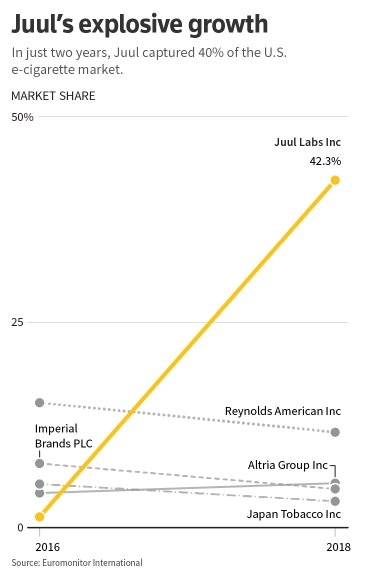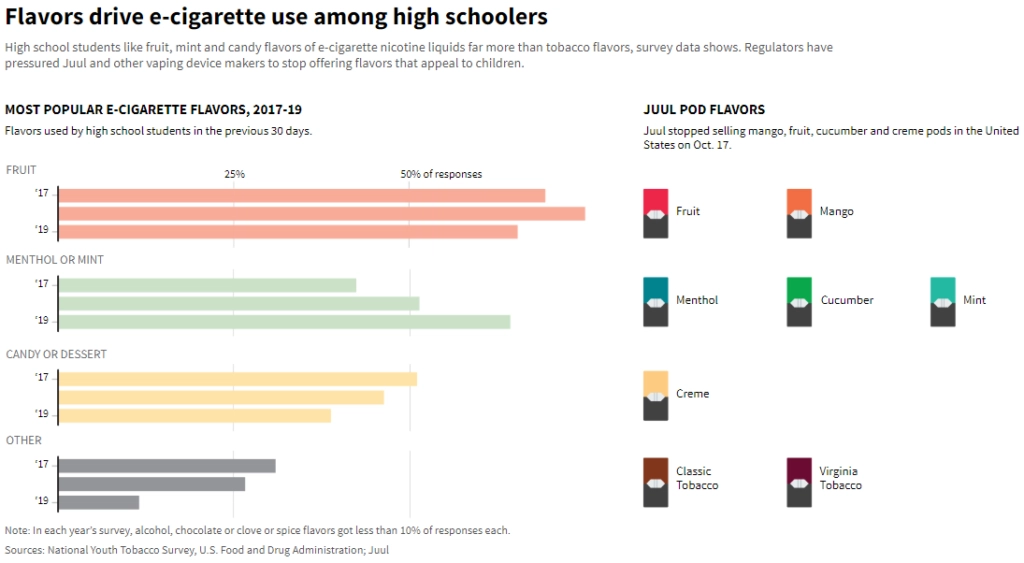Very soon after Juul hit the market in 2015, company executives became aware that teenagers were flocking to the e-cigarette, according to a former manager. Juul’s nicotine content was so potent the company engineered a “kill switch” to restrict dosage. However, the idea was later shelved.
Executive Conflict at Juul
Early on, Juul executives had knowledge that its new products had strong appeal with young people, according to a former manager. The company’s phone was ringing away with calls from teenagers asking where they could find Juul nicotine pods and the sleek delivery device which resembles a thumb drive. The calls and other signs of underage use kicked off an internal debate among the company’s leadership which had strong views on both sides of the argument. Some, including founder James Monsees, believed that actions should be taken to stop sales to young people. Other executives such as Hoyoung Huh and early investors argued the company could not be blamed for youth sales and nicotine addiction because it was not the company’s intention to market and sell to young people.
The manager who spoke under conditions of anonymity said, “Clearly, people internally had an issue with it,” referring to underage sales. “But a lot of people had no problem with 500 percent year-over-year growth.” Juul certainly understood the short and long-term benefits to its bottom line. Hooking young customers is “the most profitable segment in the history of the tobacco industry” as documented by research showing users who start young are extremely likely to become lifelong nicotine addicts.
Reuters reports that Juul’s development team focused on a central goal of captivating users with the first hit. The company’s preliminary research revealed that consumers had rejected an earlier version of e-cigarettes because the devices failed to deliver sufficient doses of nicotine or delivered it with a harsh taste. Juul turned to the strategies of old-tobacco manufacturers by adding organic acids to nicotine which smoothed the delivery and increased the potency of each hit.

Juul’s research team tested the newly designed product on employees and consumer groups finding it worked a little too well. The reformulated product delivered nicotine to the bloodstream so efficiently that it sometimes caused users to begin shaking or even sent them to the restroom to vomit. According to a former Juul scientist, Chenyue Xing, the company explored ways to stop users from consuming too much nicotine too quickly such as a kill switch that would shut down the device for 30 minutes after a certain number of puffs.
Xing said, “You hope that they get what they want, and they stop. We didn’t want to introduce a new product with a stronger addictive power.” In the end, the company never produced a version of the e-cigarette that limited nicotine intake. Xing was not directly involved with engineering and did not know why the dosage control feature was not added.
Epidemic of Teen Addiction
Juul is currently in the crosshairs of a major controversy brewing over the safety of vaping products and the epidemic of teenage addiction. The company’s sales over the past 3 years shows a strong correlation to the rise in teenage addiction that is attracting widespread criticism. In response to these concerns, Juul told regulators that it never intended to attract underage consumers. Company executives went on to say that they needed to “earn back the trust of regulators, policy makers, key stakeholders and society at large,” as vaping by young people has reached ‘unacceptable’ levels. Juul did not comment on its decision not to produce a vaping delivery system that limited nicotine intake.
Juul is facing pressure from just about every level and has faced a series of high-level executive departures including CEO Kevin Burns who left in September. In November 2018, the FDA revealed that vaping had increased nearly 80 percent among high school aged kids and 50 percent among middle schoolers over the past 12 months. A more recent FDA study warned about unauthorized health claims that Juul was a safer alternative that cigarettes. Following that, the Trump administration proposed a ban on all flavored e-cigarettes except natural tobacco. In response, Juul decided to voluntarily pull flavored pods from retail shelved in the U.S.

Marketing to Young People
Also under investigation by Congress, are the marketing tactics used by Juul which are clearly targeted to young people using attractive flavors such as cucumber, cream and mango. Juul advertising typically features hip, young users enjoying their vape and having fun with their hip friends. Early advertising seldom mentioned nicotine at all but focused on positioning Juul as a stylish and safer alternative to cigarettes.
The story to retailers was much different. In order to win shelf space, Juul’s sales team played up the unique addictive power of Juul and the efficiency at which it delivers nicotine to the user’s bloodstream. According to Vincent Latronica, who headed U.S. East Coast sales and distribution for the company from 2014 to 2016, the addictiveness statistics became a central selling point to overcome retailer’s doubts about the ability of e-cigarettes to gain market share against traditional tobacco.
The company has stated that some of the earlier ad campaigns were skewed towards a younger demographic targeting potential customers in their mid-20 and early 30s.
Damaging Health Impacts of Juul
Today, researchers are not clear on the long-term health impacts of vaping. Along with the problem of addiction, several health conditions have arisen that could be tied to the use of e-cigarettes including a mysterious lung disease that has been diagnosed in several hundred vape users, claiming the lives of at least 10. Bonnie Halpren-Felsher, professor of pediatrics at Stanford University’s Medical School, is concerned about the use of a “very, very addictive” product by young people whose brains have not fully developed. “Rather than your brain getting pleasure from exercising or relationships, your brain becomes rewired to get pleasure from nicotine.”
The engineered formula using “nicotine salts” which makes the e-cigarette so addictive makes Juul particularly attractive to teenagers and other new users who have likely never tried traditional cigarettes, according to interviews with tobacco researchers, pediatricians and other experts in nicotine delivery chemistry. Both the company’s own research as well as emerging academic research shows the delivery of nicotine into the blood stream is both more efficient and more potent than a traditional cigarette. Other negative health impacts such as chest pains, migraines, stomach pain, cognitive problems and depression have also been reported by parents of young people that are heavy users of Juul.
Mass Tort Litigation Against Juul
The community of mass tort plaintiff attorneys are taking up the cause and fighting back against Juul. To date, thousands of plaintiffs have come forward claiming injury and seeking damages against the company. As the litigation unfolds over the next several years, thousands of additional potential plaintiffs will likely surface.
Last month the Judicial Panel on Multi-district litigation issued an MDL 2913 transfer order consolidating the Juul docket in the U.S. District Court, Northern District of California in front of Judge William Orrick. In the lawsuit, Juul is accused of deceptive marketing practices and failing to warn consumers about the risks of its e-cigarette products. The suit alleges that Juul unlawfully marketed its products to teens and failed to disclose the true amount of nicotine delivered through its products.
Acquiring and Proving Cases for Your Firm
Our Juul case development team assists law firms in qualifying potential clients by determining proof of use and proof of injury from Juul products. We can help you find and retain clients, complete the medical record review, and get the cases ready to file or refer to co-counsel through our partnership network.
If your law firm is considering joining the fight for justice for those harmed by Juul contact us today for a free consultation at (512) 925-0953.
References:
Article by Chris Kirkham, “Juul disregarded early evidence it was hooking teens”
Reuters, Published on November 6, 2019